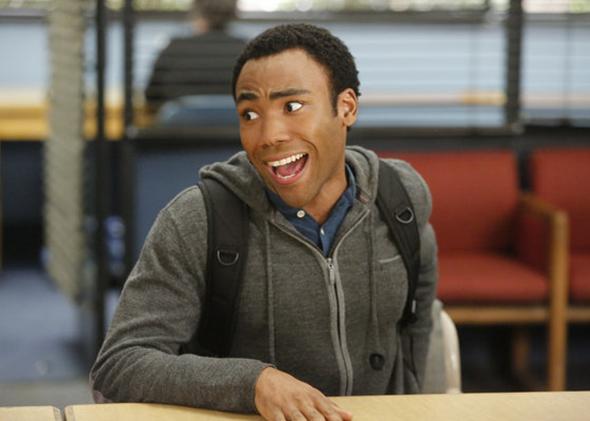A long time ago, in Season 2 of Community, the passionately adored sitcom returning to NBC Thursday night, Abed Nadir (Danny Pudi), the show’s Aspergian pop-culture savant, tore through the halls of Greendale Community College dressed like the main character in The Cape, a real NBC drama airing that season. The cynical Jeff Winger (Joel McHale) pooh-poohed Abed’s devotion: “The show’s going to last three weeks,” he said. Abed, running off, hollered back, “Six seasons and a movie!” When Community was in danger of cancellation—a near-perpetual state for a show that has averaged about 3 million viewers—its fans took Abed’s phrase on as their own battle cry.
“Six seasons and a movie” was originally the sentiment of the super-fan, of Abed and then the passionate Communards who love him and his pals. But as Community has trundled along, the distinction between a fan-fueled “six seasons and a movie” and the corporate-fueled “100 episodes and syndication” has gotten pretty blurry. Community probably should have been canceled at the end of Season 3, when NBC fired the singular Dan Harmon, Community’s creator, mastermind, genius, and pain in the ass. But NBC opted not to do that for various financial and logistical reasons, bringing in new showrunners for Season 4 and birthing a kind of zombie Community: a show with the same actors, characters, and will to defy genre, but one missing its soul. At the end of Season 4, with 100 episodes in sight, NBC hired back Harmon. Judging from the first three episodes of this fifth season, Harmon is vindicated and triumphant, but also still pretty torn up about everything. Community is no longer a zombie, but the new episodes feel plenty funereal.
Community picks up months after the end of Season 4, when the gang graduated from Greendale. It quickly sets about re-assembling them for “contrived reasons,” as Harmon recently put it with characteristic flair in the New York Times.
Outside of the bubble of community college the characters faced very depressing realities: crappy jobs, loneliness, and in the case of Chevy Chase’s Pierce Hawthorne, death. (Chase and Harmon had a contentious working relationship; Chase decided not to return this season.) None of them have been able to survive outside of Greendale, largely because Greendale did not provide them with the tools to survive. As Jeff tells his friends, “We went into Greendale as a real people and came out as psychotic cartoons,” which, harsh as it sounds, is part of his argument for why they should re-enroll.
Community has been celebrated for its ambition, for its episodes inspired by My Dinner with Andre, featuring Claymation, spanning multiple time lines. But the first three episodes of the new season contain no genre-bending, just some light meta-commentary about Community’s resemblance to the final season of Scrubs and a heavy dose of pathos. The best episode of the bunch, “Cooperative Polygraphy” (featuring a guest turn from Justified’s Walton Goggins, sans Southern accent) is very funny and yet almost entirely focused on the lies, betrayals, and secrets that exist between the close knit-characters and are constantly threatening to rip them apart. Community is about a makeshift family, but one that fights with the abandon of a real one.
Hanging over these episodes isn’t just Pierce’s death, the group’s professional failures, and Dan Harmon’s ire and insecurity—it’s Donald Glover’s imminent departure. Glover, who plays sweet jock Troy, will only appear in the first five episodes, sad news for Community’s true love story, the friendship of Troy and Abed. (I’ve always thought that of all the things that drove Harmon wild about last season, the emphasis on the Britta-Troy relationship must have been the one he hated most.) Troy and Abed adore, understand, and enjoy each other unconditionally, an innocent intimacy so fulfilling it has kept them both from growing up: Who needs a girlfriend when you can build pillow forts with your bestie all day? The totality of their soul connection has grounded so much of Community’s high-flying genre work, given it feeling and emotional heft—and it’s about to be done. It is a pretty dark timeline, indeed. And maybe when Community is through mourning it, it will get on with being a sitcom.
